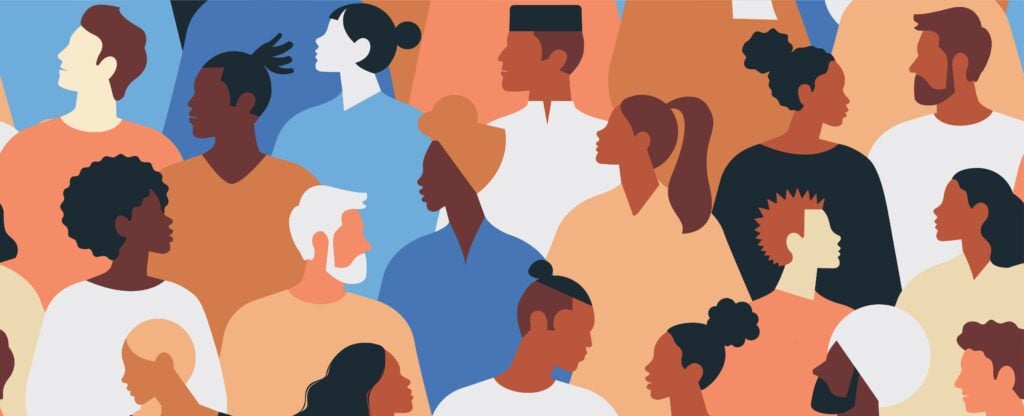What is race-based traumatic stress (RBTS)?
Reviewed by Monika Cope-Ward, LCSW

Race-based traumatic stress (RBTS) is a form of psychological distress that people from systemically excluded racial groups experience after being exposed to race-related stressors. Often referred to as “race-based trauma” or “racial trauma,” RBTS can affect a person’s mental, emotional, and physical well-being. It may be triggered by a single event or by a series of traumatic incidents and stressors. The impact of these stressors tends to build over time.


Who experiences RBTS?
“People of color” is a term used to describe people who are not White. This can include people of African American, Latinx/Hispanic, Native American, Asian American, and/or Pacific Islander ancestry. All people of color have a long history of being oppressed by societal institutions, and they face higher rates of poverty, unemployment, mental and physical health concerns, and economic hardships than White people do.1 Black, Indigenous, people of color (BIPOC) tend to be especially vulnerable to RBTS.
People of color are likely to encounter bias based on ethnic and racial identifiers such as skin color, facial features, and hair textures. This bias makes it difficult for people of color to access essential resources like employment and housing opportunities, quality health care, and education. Communities of color also experience greater exposure to violence.2
RBTS vs. posttraumatic stress disorder
People who experience RBTS show signs and symptoms similar to those of posttraumatic stress disorder (PTSD), although the symptoms tend to be overlooked and may be expressed differently.
PTSD is a mental health condition diagnosed by a medical doctor or licensed mental health practitioner. It requires being directly involved in a traumatic event; being exposed to a traumatic event, such as witnessing someone else’s trauma; learning someone close to you has gone through trauma; or being exposed repeatedly to graphic details of trauma (for example, if you work as a first responder). Typical signs of PTSD include nightmares, sadness, anger, isolation, flashbacks to the traumatic experience, and persistent fear that the experience will happen again.
RBTS is considered a mental and emotional injury. It’s a stress response within a social context, rather than a stress response to a specific traumatic event. That said, it’s entirely possible for RBTS to contribute to PTSD. Some or all of the symptoms of PTSD can appear in people who experience racism, prejudice based on the color of their skin, and day-to-day life in a society where racism is unavoidable.
Causes of RBTS
RBTS is common among survivors of hate crimes or police violence, but it can also be caused by other forms of societal discrimination. The core component tying all these root causes together is fear: the fear of being “othered,” of being treated as a threat, or of your race being seen as a burden or liability.
Institutionalized racism
“Institutionalized racism” refers to systems designed to benefit one race or group, primarily White people, while discriminating against others. In one example of the effects, Black people are incarcerated at higher rates than White people who commit similar offenses.3 Institutionalized racism is also front and center in corporate America, where managers are more likely to hire White candidates over candidates of color.4
Microaggressions
Microaggressions are subtle racist attitudes or actions directed at people of color, most often verbally and subconsciously. They may be couched as compliments, but in reality they’re demeaning and offensive. For example, when a White manager says “Your English is great” to an Asian American employee, it communicates the stereotype of Asian Americans as “foreign,” when the employee may have been born and raised in the US with English as their first language.
Stereotypes
Stereotypes are oversimplified ideas about a group of people that stem from ignorance or prejudice. Negative stereotypes are especially harmful because they label and alienate those groups.
Witnessing racism
A person doesn’t have to be the target of discrimination for them to experience RBTS. They may witness the abuse of a loved one, a community member, or a complete stranger of the same race or ethnicity. Witnessing the race-based mistreatment of others can be as traumatizing as being the subject.
Media coverage
News outlets and other forms of media regularly run negative stories about people of color.5 A report from the Equal Justice Initiative on racial bias in the media showed that news stories used mug shots in 45% of criminal cases involving Black defendants, compared to 9% of cases involving White defendants.6 The media also has a history of framing stories in ways that downplay the severity of racism, which can contribute to RBTS.
Symptoms of RBTS
The fear and stress associated with RBTS can feel endless. In addition to impacting your emotional well-being, this distress can contribute to mental health conditions like depression, anxiety, or PTSD.
RBTS symptoms can manifest in your feelings, your thinking, your behavior, or your physiological state. They may include:
- Unexplained, uncontrollable bouts of anxiety, stress, or fear
- Self-destructive thoughts or behavior
- Being easily startled or on edge
- Difficulty concentrating or completing tasks
- Increased anger or rage
- Feeling constantly threatened
- Having negative perceptions of authority figures (such as government officials or law enforcement officers)
- Feeling like an outsider or disconnected from society
- Difficulty trusting others
- Trouble finding a sense of belonging in your community or society at large
- Heightened stress after exposure to racial triggers (such as hearing racial slurs or seeing racist imagery)
- Nightmares or flashbacks related to race-based events
- Being especially cautious around law enforcement officials
- Difficulty communicating thoughts and feelings related to trauma
- Trouble finding meaning in life
- Increased risk of addiction or substance abuse
- Difficulty sleeping
- Other health concerns that aren’t the result of a separate medical condition
If you or someone you know is in crisis because of RBTS, PTSD, or any other reason, help is available now. Contact the 988 Lifeline by texting 988 or calling 1-800-273-TALK (8255) for free, confidential support 24 hours a day, 7 days a week.
Diagnosis and treatment for RBTS
Assessing and diagnosing race-based traumatic stress can be difficult. The main challenges stem from an overall lack of awareness and understanding about this type of trauma and how it can impact a person’s mental health.
To properly assess and diagnosis a person with RBTS, a mental health professional must be culturally competent. Unfortunately, a therapist’s own biases or tendency to buy into stereotypes about people of color can be a major barrier.7 This makes it harder for people with symptoms of RBTS to feel safe reaching out for help, because they may not receive proper treatment.
Treatment options
Currently there’s no specialized treatment for RBTS, but people can still benefit from working with a mental health professional. Finding a therapist who specifically understands issues of race and racial dynamics, and who can relate to those concerns, may be the most effective way to treat RBTS. Your therapist may suggest any of the following methods.
Cognitive behavioral therapy (CBT) involves identifying, understanding, and correcting inaccurate or negative thoughts and beliefs. Cognitive processing therapy (CPT) is a type of CBT that may also be recommended for people with PTSD-like symptoms.
Exposure therapy involves gradual exposure to traumatic memories or reminders. The goal is to establish a certain level of comfort and safety through the process, so it becomes easier for you to manage trigger responses.
Psychodynamic therapy looks at how past experiences become integrated into your thoughts, feelings, and relationships.
Family therapy examines how family relationships are affected by a family member’s symptoms. It can be used to help foster conversations about RBTS, enhancing awareness and understanding.
Resilience-based therapies help you identify strengths that emerge from trauma, so you can use them to help cope with symptoms.
Support groups give you the opportunity to talk about your experiences, connect with others, and share coping strategies.
Multicultural counseling is based on the idea that culture affects your perceptions, beliefs, and behaviors.
Psychedelic-assisted therapy may help reduce symptoms of traumatic stress, anxiety, and depression in people of color.8
Medication can be prescribed if you’re having symptoms of mental health conditions like anxiety, depression, or PTSD.
Managing RBTS symptoms
Lifestyle habits can also help you manage RBTS symptoms:
- Writing down your feelings about traumatic experiences and recording daily events can help reduce stress and anxiety.
- Practicing emotional regulation techniques like self-care, stress management, mindfulness, and meditation can help you manage your feelings and focus your attention on how you want things to be.
- Being active can help you channel and release your energy, which may help relieve stress.
- Practicing self-compassion can help you be kinder to yourself and move away from habits of self-criticism or self-punishment.
- Connecting with others who share common interests or experiences can help you find understanding and validation for your feelings.
If you or someone you know is experiencing symptoms of RBTS, or if racism and discrimination are affecting your mental health in other ways, support is available. Browse our directory to connect with a therapist who can specializes in trauma or PTSD and can help you begin the healing process.

Sources
1 https://pubmed.ncbi.nlm.nih.gov/30668268/
2 https://journals.plos.org/plosone/article?id=10.1371/journal.pone.0229686
3 https://www.sentencingproject.org/reports/the-color-of-justice-racial-and-ethnic-disparity-in-state-prisons-the-sentencing-project/
4 https://journals.sagepub.com/doi/abs/10.1177/0001839216639577/
5 https://colorofchange.org/wp-content/uploads/2019/05/COC-FS-Families-Representation-Report_Full_121217.pdf
6 https://eji.org/news/report-documents-racial-bias-in-coverage-of-crime-by-media/
7 https://www.ncbi.nlm.nih.gov/pmc/articles/PMC5333436/
8 https://www.ncbi.nlm.nih.gov/pmc/articles/PMC8330400/
About the author
The editorial team at therapist.com works with the world’s leading clinical experts to bring you accessible, insightful information about mental health topics and trends.
Related articles

What does it mean to decolonize therapy?
A mental health movement is underway to center the historically excluded voices...

How to create positive change every day
Dr. Martin Luther King Jr. advocated for justice, peace, and freedom. You can...

Unhealed bodies: Looking at ancestral trauma
Resmaa Menakem, author of My Grandmother’s Hands, discusses racialized trauma...

Race, ethnicity, and mental health
Race and ethnicity are invented concepts, but they still affect how others...
